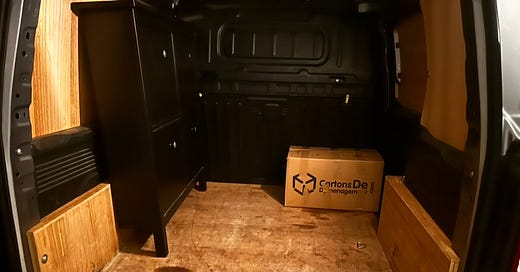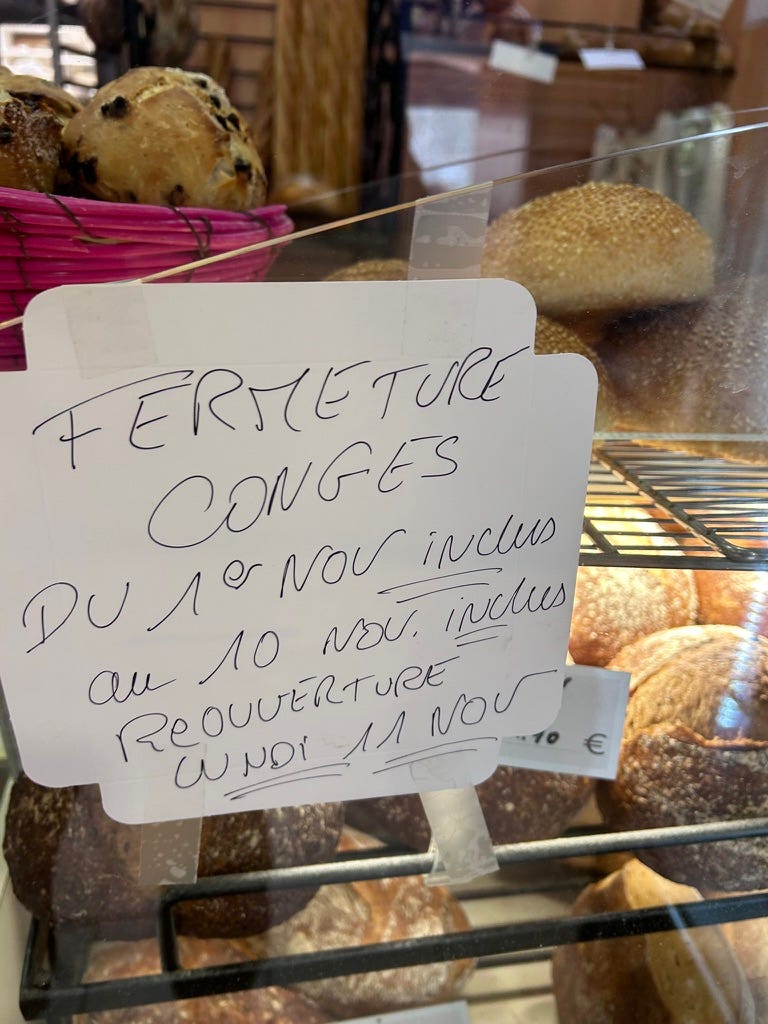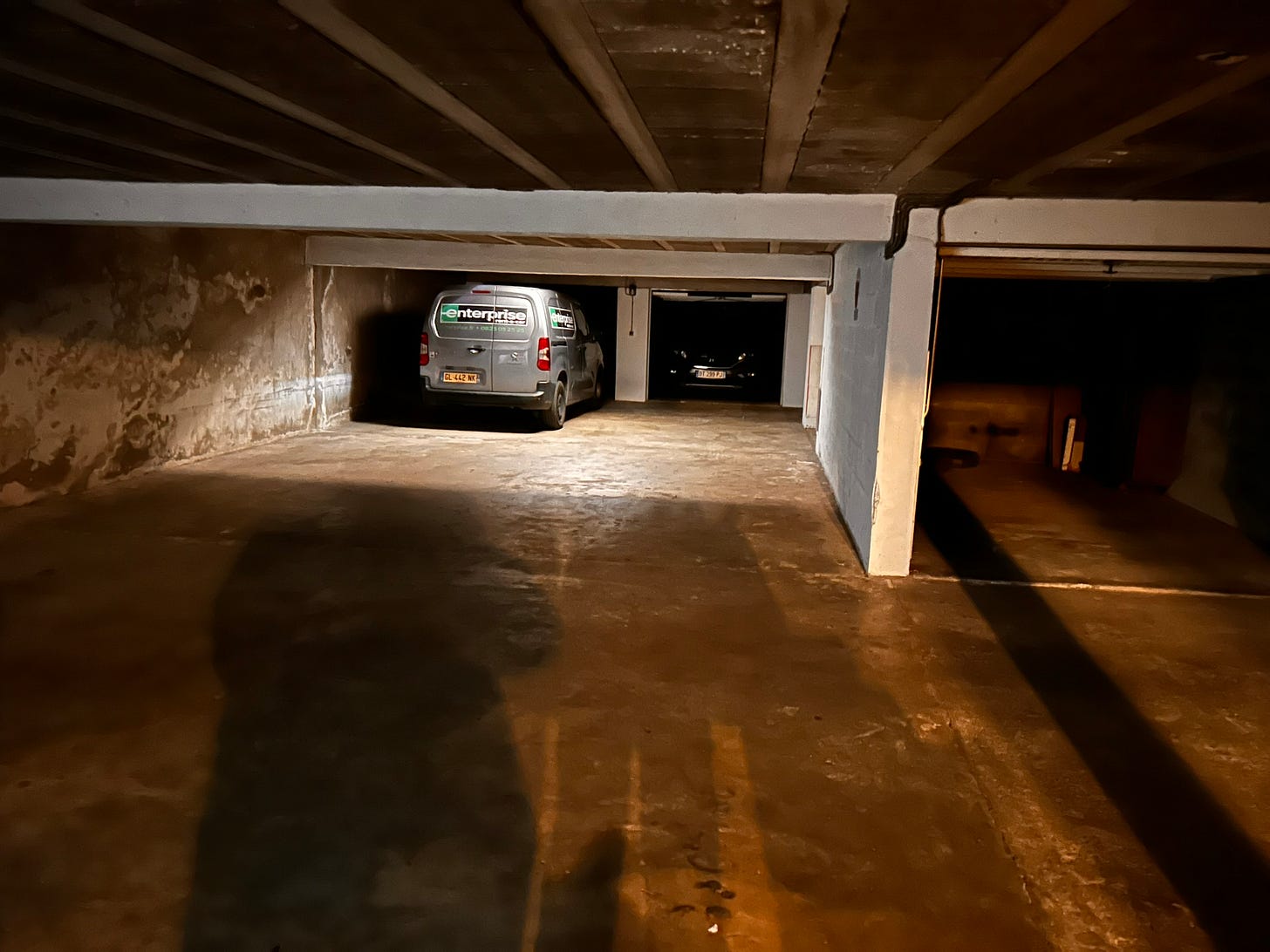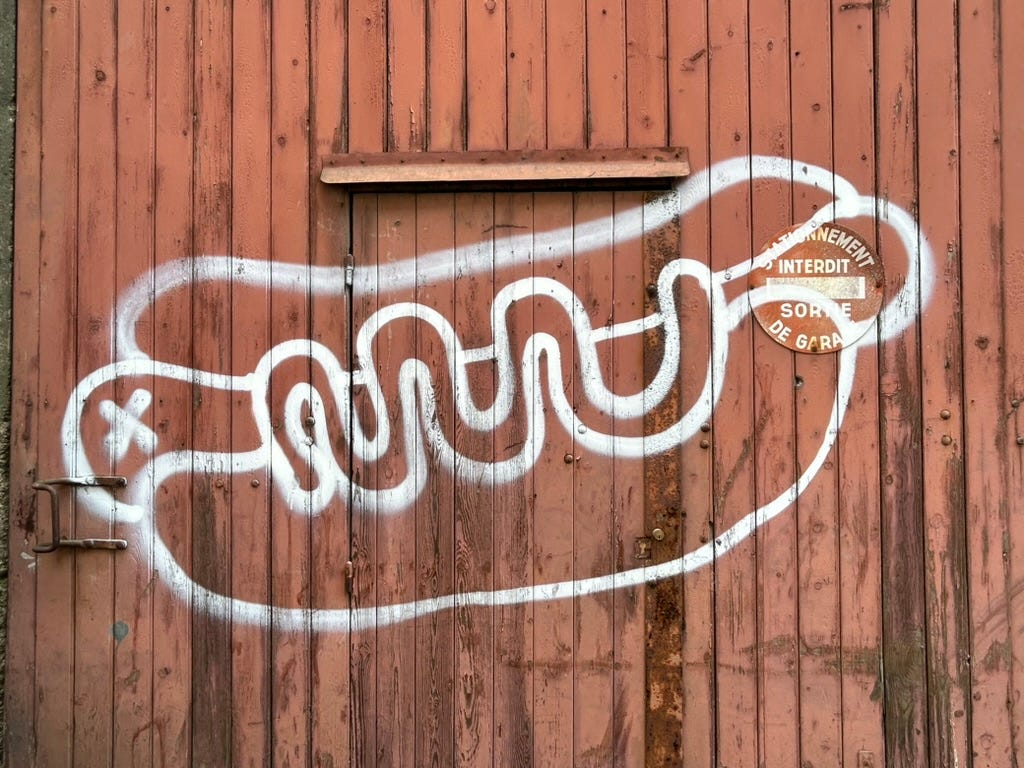The Art of Moving (And Staying) Abroad
Navigating life in a new country after the novelty wears off.
Adjusting to life in a new country doesn’t end once you’ve unpacked and settled in—it’s an ongoing process of adaptation, surprises, and the occasional bureaucratic headache. As the novelty fades, the real challenge begins: learning how to function within a different system, navigating cultural nuances, and figuring out what still feels foreign (and what, strangely, no longer does). Whether you're planning a move or already abroad, here’s what happens after you start to get used to it.
In short, I like France. We never expected it to be easy here or to have people cater to our preferences. We didn’t expect a rose garden - although to be fair, setting up and maintaining a rose garden is, in reality, a huge pain in the ass, a “labor of love,” if you want to call it that.
TL;DR : This post is me talking about a lot of that, but you could skip it all and just go to the polls and music videos at the end…
The Strange, Unexpected Reality of Life Abroad
While visas and paperwork are immensely important—it’s about the moments that catch you totally off guard, the small surprises, and the way a place slowly reshapes you, which is something I am constantly rediscovering.
As I have said before, we will never be French, but we can be at home here. In time.
Though it must be said that there rarely seems to be a week without some kind of paperwork consideration, especially this week when changing your living situation…? Man, does that just turn your life upside down and shake it out a bit.
We’re moving this week, and it is a process. For those of you who read regularly, you know it’s been an intense month.
I still am not sure how to forward our mail. Seems important, considering that this country still really likes to have things done on paper. It seems inefficient at times, but that has its limits. Democracy is ultimately, a very inefficient system, but when considering one’s quality of life, efficiency is not a great producer of art, culture, even science. I don’t want my life to be efficient that way.
I’ve meant to write more about the practical aspects of moving abroad—what it takes to pack up, navigate the bureaucracy, and settle into a new life. But honestly, there are already plenty of great sources out there for that and I should forward on and restack the many great writers out there doing that work.
What I’m more interested in (and what I keep running into, day after day) are the oddities of life in another country. The things that make you stop in your tracks, questioning everything you thought you knew about how the world works.
The Comedy & Chaos of Daily Life
Honestly, this has been a big and important lesson about moving out of your home country—one that I don’t see talked about enough. This entire process is emotionally chaotic and it’s hard to say how or when it will throw you.
I try to capture how disorienting it all is. And I try to be funny about it because you can’t take it all so seriously. It’ll drive you crazy.
That’s a big part of what I want to do here: not just cover visas, rentals, and tax forms (though those will come up), but also the small, unexpected hurdles and strange little stuff of life abroad. Because whether you’re seriously considering leaving the U.S. or just curious about what it’s like elsewhere, these are the moments that truly shape the experience.
All of those odd, awkward moments I describe—before and after leaving the U.S.—were my everyday reality. I kept turning them over in my mind, again and again.
They stuck with me.
And they matter.
I’m not always 100% sure why they matter, long-term, but in the middle of those moments, they felt like everything.
The Realities (and Charms) of Life Abroad
Due to recent events, I know a lot of people are seriously considering a move—or at least wondering what staying in the U.S. will mean for them. And I get it. I really do. I’ve been through the process of leaving, landing, and learning how to exist somewhere new.
For starters, nobody has been waiting for you to arrive, nor should they be expected to cater to your personal (or cultural) expectations of, well, anything at all. I could go on about the many ways that this manifests, but that’s not what today’s post is about.
But still, it will fuck with you.
Get ready for that. And, more importantly, it will continue to fuck with you until you get used to it, figure it out, etc. And then it will probably fuck with you again in yet some other way that you didn’t plan for or consider before because, well, life was in fact, fucking with you like that back at home as well.
And this is still life, it’s just in a new place with new rules and new everything - and that is good.
It’s a lot. Not just the logistics, but the daily grind of rewiring your brain to function in a different system.
the state of the place
This week we’re about to go through l’état des lieux (“the state of places”)—the dreaded Inventory process you go through when renting (or buying) a place in France. Imagine the most detailed home inspection you can think of, then add an exhaustive written report cataloging every single flaw, down to a scratch on the doorframe. It is done by an independent agency, apart from the real estate folks and the owners, that may not do anything else except check over buildings and apartments in this way.
This is unlike anything I have ever experienced in the US with multiple rentals and home purchases over the years. Our Inventory documentation on our first apartment in France was over 70 pages long - with appendices, endless photos, etc.
So now, it’s our life being reviewed, our space under scrutiny. This, combined with my wife’s impeccable standards has us doing a lot of work this week. I can promise you: the place will be left in better shape than when we arrived 2 years again.
Honestly, the closest U.S. comparison I can think of is those times when I was being observed as a teacher, and everyone knew it was going badly—live, in real time. I knew it, the kids knew it, the administrators knew it—and then it was all meticulously documented so we could rehash it later.
Humbling.
But this, too, is part of the experience. France is a funny place. Bureaucracy forces you to slow down, take stock, and (sometimes) wonder how anything here functions at all.
And yet, it does. And it worked just fine before I showed up and will continue to do so. It is up to me to adapt to it.
I used to be surprised all the time. Now I’m surprised when something doesn’t surprise me. I suppose that’s a sign of getting used to a place.
The Bureaucratic Endurance Test You Didn’t Train For
Sometimes, being an outsider lets you see a place differently. That also means you get blindsided by things locals don’t even think about. It can be isolating. It can be overwhelming.
Like moving.
Because moving here isn’t just about packing boxes, although that is clearly a pain in the ass. It’s about negotiating the details in another language, while exhausted, with systems you don’t entirely understand.
Then, just when you’re at your absolute limit, perhaps someone at the power company decides that is the perfect time for a 30-minute conversation about your electricity options.
I’m convinced there is a secret Code of Conduct for French Customer Service Call Centers that said that “The ideal time to speak with a client is a minimum of 30 minutes.”
Barely able to function, but too tired to cut them off—which wouldn’t help anyway—listening as a fully caffeinated, enthusiastic Representative walks me through wind power options, the advantages of off-peak pricing, and many other choices, options and numbers.
In any case - no wonder the French move half as often as American (Americans move a lot): the whole system is designed to discourage it.
I am sure that I signed up for a bunch of energy services I don’t need or want. Thankfully, there are fewer options than in the US, so I can’t even buy a bedazzled electrical panel or something equally pointless, but now I have to go and cancel all of those.
What Comes Next (And How You Can Help)
I want to keep making this newsletter something you actually want to read. I don’t want to just send things out into the void—I want this to be useful, thought-provoking, or at the very least, entertaining.
And entertainment is useful. Isn’t it?
So, I need your input.
I’ve been thinking about switching up the format. Do you want more long-form pieces? Or should I experiment with a mix of short insights within longer posts? More playlists? More history? Something else entirely? Let me know in the comments, and I’ll also put up a poll so you can weigh in.
The truth is, I need to work on promoting this thing. I’d love to grow a kind of community around this, but I can’t do it alone. If you’ve been enjoying what I write, you could do me a huge favor by sharing this with someone who might like it. Maybe a friend who’s thinking of moving abroad, someone who loves travel, or just that one person in your life who appreciates weird, overly specific deep dives into bureaucracy, history, and culture.
Course 201
In my mind, this whole blog feels like a class—a strange one, sure, but a class just the same. And now, with over 200 posts under our belt, I think it’s time to take things to the next level.
If the first 200 posts were Moving Abroad 101—the basics: how to navigate bureaucracy, cultural weirdness, and daily surprises—then what comes next?
I am not even sure that’s what I delivered with the first 200 posts.
When I’m doing this right, I hope it’s it’s surprising for everyone—Americans, the French, and anyone else who happens to be reading. It’s a big and interesting world and there were people here before now making choices that we may never have considered.
There is always an alternative to the story being told, a part not taken. I like to say that “all objects cast a shadow,” by which I mean anything that you see also had alternatives, more details.
This may have been better said by Bruce Lee’s “I am point at the moon and you’re looking at my finger” comment.
Bref, allons droit au but (Let’s cut to the chase.)
I want to make this next phase of the blog even better. If the first 200 posts were about getting here, the next 200 should be about being here—what happens when the newness wears off, and you realize you’ve started to absorb a place, whether you meant to or not.
France is full of weird, wonderful contradictions. This country documents everything—the level of archival obsession is truly impressive. And yet, sometimes, things still seem to function on pure improvisation.
And I want to know what you want more of:
Deeper dives? Culture, history, bureaucracy? For obvious reasons, these are longer pieces.
More playlists? I really, really enjoy learning about a place through music. I never knew France was this into funk, for example. Are my readers even on Spotify?
More day-to-day absurdities? The little things that become normal until you step back and realize how strange they are? Ot the natural fact that I, as an American, am naturally a bit weird here in France.
More practical guides, but with my own personal flair? (Like How to Survive L’État des Lieux Without Losing Your Mind or Why French Bureaucracy Is Secretly a Kind of Philosophy Lesson.)
The Poll!
So, let’s think of this as our own little Formative Assessment—how can I make this a better experience for you, if that’s what this is?
Apologies for the overly teacher-y tone. It’s been a week.
If this doesn’t cover what you’re looking for, tell me in the comments below…
Whaddaya wanna see?
Howya wanna see it?
Why This Matters (And Why I’m Thankful)
We’re all bombarded with content every day. The only thing I can promise is that I’ll try to make this worth your time—something interesting, something you won’t find everywhere else, something fueled by my own (sometimes obsessive) curiosity.
Beyond that, I’m open to suggestions & I want to hear from you.
Eventually, I’ll run out of ideas, and I’d rather that happen later rather than sooner.
When I started this, someone told me that writing and posting consistently for a year will change how you think. And they were right. It has. And that’s thanks to you. This community—small but mighty—reads what I write. For the number of subscribers I have, the readership rate is surprisingly high, and that means a lot.
So thank you for reading. Thank you for being here. And if you want to help keep this going, consider buying me a coffee—you can do that here. It helps keep me going and maybe helps to make it better for you.
Your subscriptions matter. I write to make sense of the world for myself, but I write it for you as well. Both things happen at the same time.
And, as always, drop a comment. Let me know what you want to see.
More soon. And thanks, as always, for reading.
Entertainment is useful. It is.
This kind of music actually gets radio play here. I’m not sure if this song is having a resurgence, but I’ve heard it a few times in the past weeks.
The whole vibe of the 40th anniversary re-release video is wonderful to me. Because with all of the problems of the world, this exists too.
Beauty exists, too.
All of these other possibilities, they exist as well.
à la prochaine,
K








First timer here and enjoyed reading this article. You have a very friendly and conversational tone, which is welcoming. I'd like to read more about the things you find odd or culturally jarring/shocking as an American, as well as culture and new perspectives. The length doesn't matter as much to me as long as it's interesting and engaging.
I remember keeping a blog in the early 2000's when I first moved to Sweden. I wrote about the oddities and the fresh observations of a new country and it was entertaining to my readers from around the world, but mostly to myself, ha ha!
A la prochaine!
God speed to you two as you go through the paces.